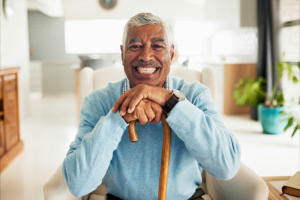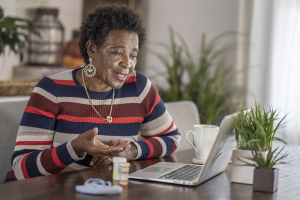Battling the Fear of Falling: Empowerment Strategies for Seniors

Try these tips to help someone you love overcome a fear of falling.
As we grow older, it’s natural to become more apprehensive about the possibility of falling. For many people, however, the fear of falling can be paralyzing, causing a decrease in physical activity, social engagement, and overall quality of life. It is important to address this fear head-on and empower older adults to live confidently and fearlessly. Here are some useful strategies to help those you love overcome anxiety about falling:
- Gain Education: Understanding the factors that contribute to falls and the steps which can be taken to prevent them is crucial. By educating themselves about balance, strength, and mobility exercises, older adults can feel more equipped to take control of their physical health. Learning about proper nutrition, hydration, and medication management can also play an important role in fall prevention and overall well-being.
- Establish a Support Network: Social isolation can exacerbate the fear of falling. Encourage older loved ones to remain connected with friends, family, and community groups. Having a strong support network can offer emotional support, encouragement, and assistance when needed. Consider organizing regular activities or social outings to help combat loneliness and foster a sense of belonging.
- Modify the Home: Making simple modifications to the home environment can significantly decrease the risk of falls. Installing grab bars in the bathroom, securing rugs, improving lighting, and eliminating clutter are just a few examples of changes that can enhance safety and provide peace of mind. Consider conducting a home safety assessment to identify potential hazards and implement appropriate modifications.
- Stay Active: Regular physical activity improves strength and balance while boosting confidence and decreasing the risk of falling. Encourage older loved ones to take part in activities they enjoy, whether it’s walking, swimming, yoga, or tai chi. It is never too late to begin reaping the advantages of an active lifestyle. Group exercise classes specifically designed for older adults can provide social interaction and motivation to remain active.
- Use Assistive Devices: For people with mobility issues, assistive devices such as canes, walkers, or stairlifts can offer added stability and confidence. Encourage older adults to use these devices as needed to maintain their independence and safety. Proper training on how to use assistive devices is essential to ensure their effectiveness.
- Practice Mindfulness: Mindfulness techniques which can include deep breathing, meditation, and visualization can help people manage anxiety and fear. By focusing on the present moment and cultivating a sense of calm, older adults can decrease stress and approach life with greater self-assurance. Encourage loved ones to incorporate mindfulness practices into their daily routine for improved emotional well-being.
- Seek Professional Help: If the fear of falling is significantly impacting a loved one’s day-to-day life, encourage them to seek support from a healthcare professional. A physical therapist, occupational therapist, or psychologist can offer personalized guidance and strategies for overcoming fear and improving confidence. These professionals can also address any underlying physical or mental health issues contributing to the fear of falling.
Responsive Home Care can help too! Contact us at (954) 486-6440 for details on fall prevention and other senior services in Fort Lauderdale, Hollywood, Lighthouse Point, and the surrounding areas. Our team of experienced professionals is dedicated to promoting the health, safety, and independence of older adults. From tips for home modifications to personalized support, we provide comprehensive solutions to meet the unique needs of each individual. Don’t allow the fear of falling to hold back someone you love—take proactive steps now to help them live life to the fullest.

